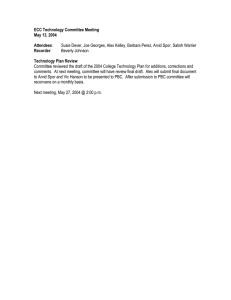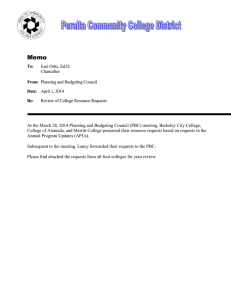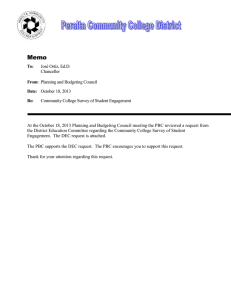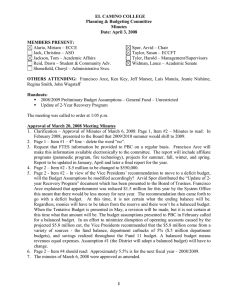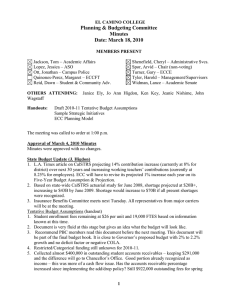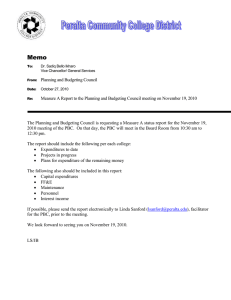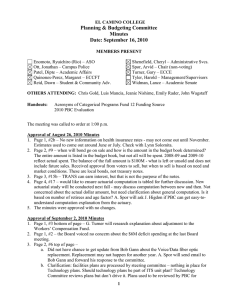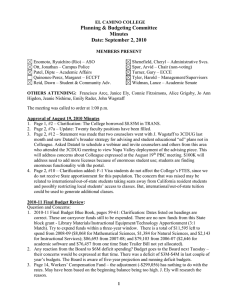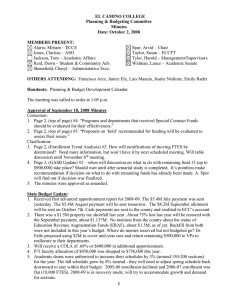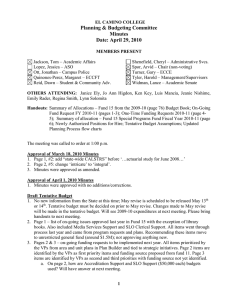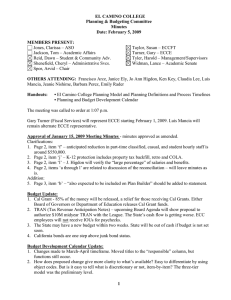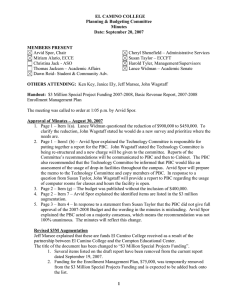November 4, 2010
advertisement
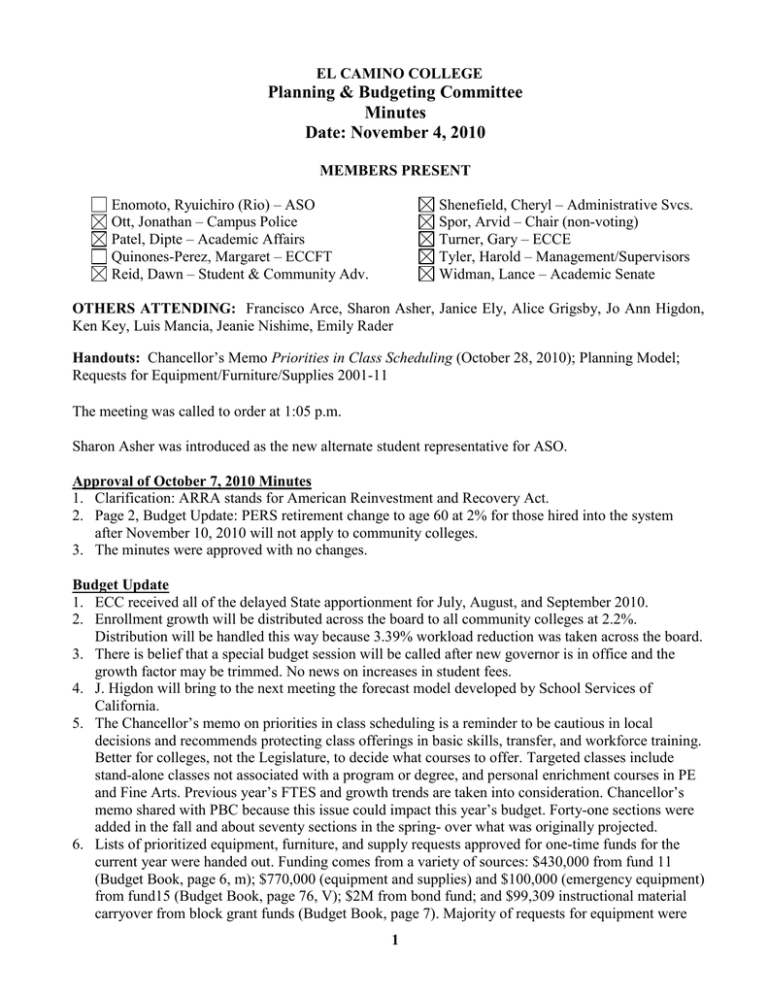
EL CAMINO COLLEGE Planning & Budgeting Committee Minutes Date: November 4, 2010 MEMBERS PRESENT Enomoto, Ryuichiro (Rio) – ASO Ott, Jonathan – Campus Police Patel, Dipte – Academic Affairs Quinones-Perez, Margaret – ECCFT Reid, Dawn – Student & Community Adv. Shenefield, Cheryl – Administrative Svcs. Spor, Arvid – Chair (non-voting) Turner, Gary – ECCE Tyler, Harold – Management/Supervisors Widman, Lance – Academic Senate OTHERS ATTENDING: Francisco Arce, Sharon Asher, Janice Ely, Alice Grigsby, Jo Ann Higdon, Ken Key, Luis Mancia, Jeanie Nishime, Emily Rader Handouts: Chancellor’s Memo Priorities in Class Scheduling (October 28, 2010); Planning Model; Requests for Equipment/Furniture/Supplies 2001-11 The meeting was called to order at 1:05 p.m. Sharon Asher was introduced as the new alternate student representative for ASO. Approval of October 7, 2010 Minutes 1. Clarification: ARRA stands for American Reinvestment and Recovery Act. 2. Page 2, Budget Update: PERS retirement change to age 60 at 2% for those hired into the system after November 10, 2010 will not apply to community colleges. 3. The minutes were approved with no changes. Budget Update 1. ECC received all of the delayed State apportionment for July, August, and September 2010. 2. Enrollment growth will be distributed across the board to all community colleges at 2.2%. Distribution will be handled this way because 3.39% workload reduction was taken across the board. 3. There is belief that a special budget session will be called after new governor is in office and the growth factor may be trimmed. No news on increases in student fees. 4. J. Higdon will bring to the next meeting the forecast model developed by School Services of California. 5. The Chancellor’s memo on priorities in class scheduling is a reminder to be cautious in local decisions and recommends protecting class offerings in basic skills, transfer, and workforce training. Better for colleges, not the Legislature, to decide what courses to offer. Targeted classes include stand-alone classes not associated with a program or degree, and personal enrichment courses in PE and Fine Arts. Previous year’s FTES and growth trends are taken into consideration. Chancellor’s memo shared with PBC because this issue could impact this year’s budget. Forty-one sections were added in the fall and about seventy sections in the spring- over what was originally projected. 6. Lists of prioritized equipment, furniture, and supply requests approved for one-time funds for the current year were handed out. Funding comes from a variety of sources: $430,000 from fund 11 (Budget Book, page 6, m); $770,000 (equipment and supplies) and $100,000 (emergency equipment) from fund15 (Budget Book, page 76, V); $2M from bond fund; and $99,309 instructional material carryover from block grant funds (Budget Book, page 7). Majority of requests for equipment were 1 from instructional area. Academic Affairs list show plan builder goals linked to strategic initiatives. F. Arce will verify correct Plan Builder plan year (2009-10 or 2010-11) for Request for Instructional Equipment (Bond) list for Academic Affairs. Funds received will be spent in 2010-11. These figures can change. What is the purpose of these lists to PBC? Shows which items were funded, how money will be allocated and spent. Comments were made that the lists are difficult to understand – need either explanation or a more organized and consistent format. A. Spor will work with the vice presidents to create a cover sheet/narrative with detailed explanation including references to the Budget Book. Clarity is needed for effective reporting to constituents. Isn’t it PBC’s job to review that planning is linked to budgeting? Striving to see that funding goes to evaluated and prioritized plans (emergency requests are an exception). Planning Process 1. PBC members are expected to be well-informed about the planning process. 2. Starting July 1, 2011, the Strategic Initiatives on page 2 will be used as goal statements for 2011-12 plans. 2011-12 program plans should be submitted before the end of the 2010 fall semester. 3. Is program review a four-year cycle? A. Spor will verify length of cycle. Curriculum review is a sixyear cycle. SLOs and curriculum are imbedded in program review. 4. Program review recommendations must be prioritized and entered into division Plan Builder plans. 5. Page 5 - flow chart of curriculum review process. 6. Page 6 – A. Spor will check with Jenny Simon and update SLO timeline chart tasks. 7. Page 7 – communication and comprehension assessment may be part of academic program review and plans. 8. Page 8 - diagram of cycle for course- and program-level SLOs. Plan Development Cycle (for next fiscal year plans) - a number of divisions are discussing, prioritizing and submitting their 2011-12 unit plans (September-December timeline on plan development cycle). 9. Page 9 – Plan Evaluation Cycle (for current year plans) - A. Spor will be sending out reminder to work on status report updates for 2010-11 plans due by end of January. Before faculty leave for winter break, status report updates for 2010-11 plans should be completed. 10. Always evaluating current year plan and planning future year plan in the fall: create future year plans during fall, effective July of the following year and update current year plans by the end of fall. PBC Calendar 1. October – December a. Review and revise planning priorities – change responsibility from PBC to Program faculty and managers. b. Discussed budget development assumptions timeline. Decision was made to move Identify budget development assumptions to January-February, #3. 2. January-February a. #2 – delete “including the funding of high priority planning initiatives.” b. Change Evaluation of current fiscal year program plan goals and objectives by January 31st to #4. 3. End of March – change “presented” to “submitted.” 4. September – add #3 Plan Builder Training (under Activities), Staff Development (under Responsible). The Committee agreed to cancel the November 18th meeting. The next meeting is scheduled on December 2, 2010. The meeting adjourned at 2:30 p.m. 2
